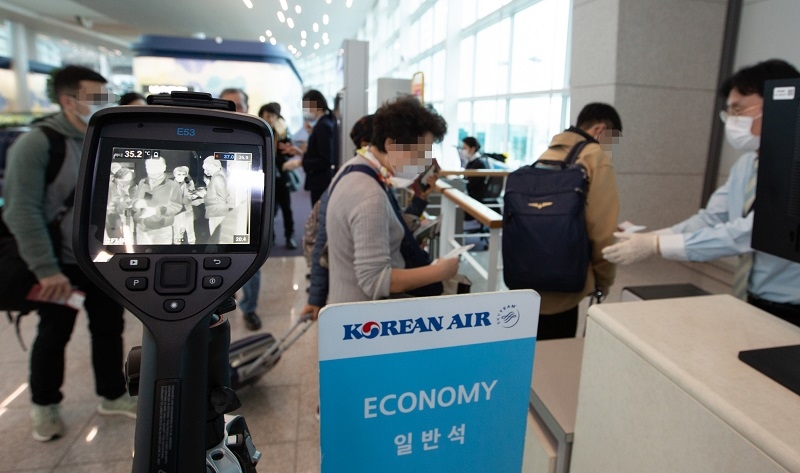Aviation groups hasten safeguards
 |
| Korean Air - illustration photo |
Korean Air, one of the world’s top 20 airlines and carrying more than 26 million passengers in 2018, announced on March 5 that it would conduct passenger temperature checks for all flights departing from Incheon from this date to cope with spreading concerns. The company will be using a total of eight thermal imaging cameras to check the temperatures of all passengers departing from the airport.
The move follows an incident of a cabin crew member who had tested positive for coronavirus last month, prompting the airline to shut down its office near Incheon International Airport, where the crew briefing room is located.
Many other international airlines are making similar moves. For instance, Japan Airlines said it is disinfecting aircraft travelling to several locations in China.
At present, international aviation giants are yet to announce any official financial losses in the Vietnamese market due to the COVID-19, although some have suspended several flights into the country.
Responding to VIR’s queries about the possible effects on Korean Air’s Vietnam operations, Mohd Zakwan Bin Zainal Rashid from the airline’s passenger marketing division said that there was “no impact on the routes”, even though the airline announced on its website last week that several routes between Incheon and destinations in Vietnam had been suspended, with some being postponed until the end of April.
However, the South Korean air carrier has suffered initial impacts. According to data from the Centre for Aviation based in Australia and global travel data provider OAG, the number of international seats for Korean Air fell by 32.6 per cent for the week of March 2, compared to the week of January 27.
Korean Air commonly operates 21 flights a week from Incheon to Ho Chi Minh City and Hanoi, and flights to the central cities of Danang and Nha Trang 14 and seven times a week, respectively.
Meanwhile, Japan Airlines has reduced or cancelled flights to China, South Korea, and Taiwan. Japan Airlines operates a number of flights between Japanese and Vietnamese cities. The airline recently signed a co-operation agreement with Vietjet to further expand the network between the two countries.
Vietnam’s aviation sector, which has boasted a two-digit growth rate since 2008, is an attractive destination to international airlines thanks to growing travel demands. The country is currently pushing efforts to control the COVID-19, continuing to help ensure airlines of its safety. At present, around 60 international airlines carry out flights to Vietnam.
Internationally, airlines are set to suffer from a lack of customers. According to the International Civil Aviation Organization, 70 air carriers cancelled all flights to China, while 50 others cut their frequency and could see a loss of $5 billion in the first quarter of 2020.
Singapore Airlines also announced almost 700 flight cancellations across its network on account of weakened demand due to the COVID-19 outbreak.
In Europe, the continent’s largest regional airline FlyBe collapsed last Thursday with the loss of more than 2,000 jobs, with the impact from the epidemic pushing it into administration.
Globally, the COVID-19 has spread to over 95 countries and territories, killing 3,500 people and infecting over 102,000 as of last Saturday afternoon. As the situation drags on, international air carriers will be forced to endure further losses.
What the stars mean:
★ Poor ★ ★ Promising ★★★ Good ★★★★ Very good ★★★★★ Exceptional
Related Contents
Latest News
More News
- VNPAY and NAPAS deepen cooperation on digital payments (February 11, 2026 | 18:21)
- Vietnam financial markets on the rise amid tailwinds (February 11, 2026 | 11:41)
- New tax incentives to benefit startups and SMEs (February 09, 2026 | 17:27)
- VIFC launches aviation finance hub to tap regional market growth (February 06, 2026 | 13:27)
- Vietnam records solid FDI performance in January (February 05, 2026 | 17:11)
- Manufacturing growth remains solid in early 2026 (February 02, 2026 | 15:28)
- EU and Vietnam elevate relations to a comprehensive strategic partnership (January 29, 2026 | 15:22)
- Vietnam to lead trade growth in ASEAN (January 29, 2026 | 15:08)
- Japanese business outlook in Vietnam turns more optimistic (January 28, 2026 | 09:54)
- Foreign leaders extend congratulations to Party General Secretary To Lam (January 25, 2026 | 10:01)

 Tag:
Tag:




















 Mobile Version
Mobile Version